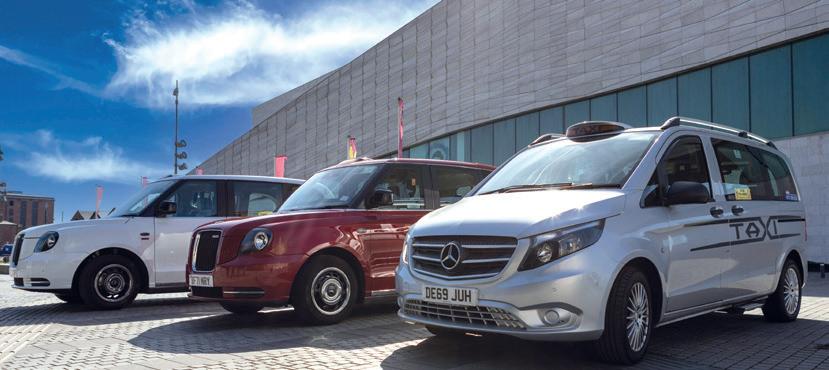
3 minute read
INVESTING, INNOVATING & EVOLVING
ComCab is Liverpool’s longest-established taxi company, proudly celebrating its 65th anniversary. Over the past seven decades, the landscape of their industry and the world around them has been driven by advancements in technology and innovation.

Since 1965, ComCab (and Mersey Cabs as it was previously known), has continually invested, evolved, and embraced technology and innovation. The focus of the business has been and continues to be looking at what improvements can be made to facilitate and improve service levels and business growth. This continued strategy has seen the business grow from a small, humble fleet to an operation that provides bookings for nearly a third of Liverpool City Council’s licensed Hackneys each week.
The foundations of the taxi industry as we know it today were laid in post-war Britain and the arrival of two-way radios. The introduction of shortwave radios was groundbreaking for the industry, providing real-time communication between passengers, drivers, and dispatchers. With the advent of two-way radios in vehicles, dispatchers could coordinate multiple vehicles simultaneously, making drivers more efficient and providing an improved service to passengers. Customers could now book transport on-demand from door to door without the need to leave their premises.
This era created a launchpad for ground transport solutions and the evolution of the taxi industry, creating opportunities for entrepreneurs to establish businesses and fleets that went from serving a village to now spanning entire countries and continents. As the Twentieth Century ended, the industry adopted the next wave of technological advancement, computer-based satellite technology. For many years, taxi companies had been limited in their ability to expand and grow. Although two-way radios had helped businesses grow from single-driver operators to multiple-driver fleets, the ability to manage larger fleets and a broader customer base was limited due to wave band congestion.
Satellite dispatch technology was the innovation that created mega-fleets and the ability for businesses to process millions of bookings annually whilst simultaneously managing hundreds of drivers at any one time. Not only did the technology make drivers more efficient, but it also increased public confidence and safety perceptions, with dispatch operators now able to track vehicles.
The twenty-first century has arguably been the smartphone app era for any consumerbased business, none more so than the taxi industry. Whereas some may point at the arrival of global ridesharing app providers as their downfall, ComCab has embraced the changes these market agitators have delivered and has continued to demand its own technology partners continue to develop and innovate.
Businesses that fail to invest and innovate will lose market share and decrease their attractiveness to other consumers and businesses. Innovation is not solely based on financial investment in technology; innovation can come in the form of the implementation of ideas, processes, and procedures a business chooses to implement to help move its business forward and remain as relevant and attractive to today’s client base as you were sixty-five years ago. You should not be afraid of change. Instead, businesses should embrace it and learn to make it work for them. Over the last 65 years, innovation has been at the forefront of the taxi industry and ComCab, from the vehicles transporting passengers to how bookings are taken, dispatched, and paid for. Much of the innovation ComCab has benefited from is a result of continual investment in technology and strategic planning. The public perception of taxi companies over the decades has been engrained from what they have seen on TV soaps, such as Coronation Street, or memories of back street minicab ranks from nights out as a teenager. Tatty smoke-filled offices, with a single person sat behind a mic’. The reality of the modern taxi company are bustling offices, driven by strategic plans, innovation, and technology. Modern taxi companies have highly skilled admin and support teams dealing with all aspects of a modern business: Finance, IT and infrastructure departments, data analysts, sales, and marketing executives, all working to support the dispatch and fleet services teams who get the vehicles from where they are to where they need to be.
As ComCab celebrates its past, it looks forward to the future and continued growth and expansion. ComCab is part of CityFleet Networks, which has a combined fleet of 1,650 vehicles between Liverpool and Chester in the Northwest. In 2024, the combined fleet is projected to complete over five million bookings, generating over fifty million pounds in the local economy. With a new online booking platform specifically tailored for corporate account holders and the full integration of automated voice technology to assist in generating a consistent and greater user experience. ComCab will continue to evolve and innovate and adapt its model to meet the demands and needs of its consumer base for many years to come.

